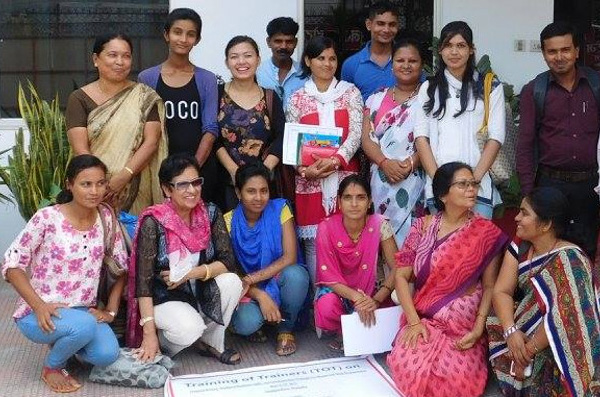
Volunteer Post
‘Connected by the Human Thread’: Celebrating International Youth Day
Program Associate, Samantha Williams. Interview with F2F volunteer, Neelam Canto-Lugo.
Since 1985, the United Nations (UN) has celebrated International Youth Day as a way to provide “international support to improve the situation of young people” and focus on the issues that affect youth around the globe.
Winrock’s USAID-funded Farmer-to-Farmer (F2F) Program in Bangladesh and Nepal engages skilled American volunteers to provide training and technical assistance to support youth entrepreneurship in the agriculture sector. In May 2016, F2F volunteer Neelam Canto-Lugo saw firsthand the direct impact that these programs can have on the lives of young people. Canto-Lugo heard about the F2F program several years ago from a colleague and former Winrock volunteer, and although she was anxious to volunteer herself, she patiently waited for an assignment that was the perfect fit.

“Since I am not a scientist or an engineer, I really had to search for a project where I could share my expertise in interpersonal relationship building, career development techniques, and communication skills – all essential to empower women and youth,” she said. “[My assignment] provided exactly the opportunity I had been seeking [in order] to fulfill my desire to serve women and youth in rural Nepal and to make […] a positive change towards their future.”
In Nepal, Canto-Lugo worked with the Women Development Advocacy Center (WDAC) to assist youth, women, and community organizers by providing training on technical proposal writing, career development strategies, and effective communication techniques.
Canto-Lugo’s time in Nepal had such a profound impact on her that she returned home determined to raise funds and collect computers for WDAC’s digital literacy project, which provides computer training to economically disadvantaged women in the Dhanusha district and places them as teachers in rural schools. To date, she has raised $3,200, received a donation of three laptops, and is expecting additional laptops and funds in the coming weeks.
“I am so very thankful to my community for supporting their fellow citizens across the world. This also shows that we are all connected by the human thread no matter where we are destined to reside.”
Can you tell us about your experience working with WDAC in Nepal?
I encountered the most dedicated and committed group of individuals who are enthusiastic and determined to find sources and strategies to improve the economic and social conditions of women and youth.
The high school graduates and young participants were given an opportunity to brainstorm in small groups and describe their areas of need. As part of the training, they learned to write clear resumes, effective cover letters, and [participate in] mock interviews. They informed me that they had never before participated in a training where they got to present their views and issues. In the past, they were often asked to simply listen. In return, I was extremely impressed by their final written work and oral presentations.
What did you enjoy most about your F2F assignment?
I was most impressed by the eagerness of the participants to learn much needed soft skills and their desire to implement them in their work and personal lives. It was heartwarming to experience the enthusiasm they displayed to improve their lives and the lives of others. I saw a tremendous spirit of volunteerism among the youth who were kind, respectful, and willing to share their limited resources with others.
The same respectful attitude, hospitality, and kindness was shown by the very delightful staff at the Winrock office in Kathmandu. Very rarely have I encountered such kindness and affection in the countries that I have traveled. I encountered so many young men and women who have become my lifelong friends.
Why do you think it is important that we focus on issues affecting youth?
In rural areas of Nepal, as in many nations, the youth are often at a disadvantage due to lack of educational excellence, technology, digital access, and employment opportunities. The trainees in my [teaching] sessions regularly expressed these concerns. They must be trained and made ready to compete with the students in urban areas and excel in job skills so they can fully participate in the modern world.
What inspired you to continue your work with the host by raising funds and seeking computers for their digital literacy project?
I was inspired to support the host by the sincere and enthusiastic response of the trainees in Janakpur and Kathmandu. I was overwhelmed by the altruistic attitude of the participants, many of whom were themselves facing very difficult situations and challenges. I was also moved and impressed by the incredible vision and undying dedication of Nanda Kishor Mandal, founder and director of WDAC, and Pradip Dutta, district coordinator in Dhanusha. [They] have been working tirelessly to bring hope and progress in the lives of the underprivileged in the Terai region. The fact that they selected Dhanusha instead of a more privileged area of Nepal speaks to their sincerity. They work day and night toward their goal in spite of limited resources.
To learn more about WDAC and their work with women and youth in Nepal, visit WDAC.org.np. For more information about volunteering with Winrock, visit winrock.org/join-us/volunteer/.
